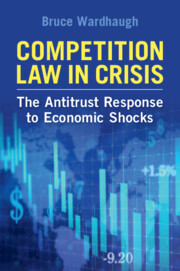Book contents
- Competition Law in Crisis
- Competition Law in Crisis
- Copyright page
- Dedication
- Contents
- Preface
- Acknowledgements
- Table of Authorities
- Introduction
- 1 The Legal Framework
- 2 The Pre–More Economic Approach to Competition’s Role in Crisis Management
- 3 The Post-MEA Relationship between Competition Law and Crisis Management
- 4 The Financial Crisis of 2008
- 5 The Covid-19 Crisis
- 6 Brexit
- 7 The Environment, Sustainability Goals and the Climate Crisis
- Conclusion
- Bibliography
- Index
3 - The Post-MEA Relationship between Competition Law and Crisis Management
Published online by Cambridge University Press: 04 August 2022
- Competition Law in Crisis
- Competition Law in Crisis
- Copyright page
- Dedication
- Contents
- Preface
- Acknowledgements
- Table of Authorities
- Introduction
- 1 The Legal Framework
- 2 The Pre–More Economic Approach to Competition’s Role in Crisis Management
- 3 The Post-MEA Relationship between Competition Law and Crisis Management
- 4 The Financial Crisis of 2008
- 5 The Covid-19 Crisis
- 6 Brexit
- 7 The Environment, Sustainability Goals and the Climate Crisis
- Conclusion
- Bibliography
- Index
Summary
Since roughly 2000, the EU Commission’s approach to competition analysis has changed, using a more economics-focused methodology, the so-called more economic approach (MEA). This chapter discusses the MEA, and its application to two crises and a sustainability/animal welfare initiative. These illustrate the use of the MEA to analyse and ultimately condemn such practices. These cases provide evidence that competition authorities have ended their tolerance for such schemes. Now, with the MEA, all such schemes are strictly analysed using the lens of consumer welfare. This of course has an advantage. Undertakings cannot ‘crisis-wash’ their behaviour, i.e. ‘dress up’ otherwise anti-competitive practices as ‘industrial crises’ to disguise a pernicious cartel. But the downsides of this new approach are that broader social concerns cannot be taken into consideration to the degree that they were in the past and the new approach may not be consistent with other goals of the EU (linked to competition via TFEU 11 and TEU 3(3)), or to other elements of UK legal order.
- Type
- Chapter
- Information
- Competition Law in CrisisThe Antitrust Response to Economic Shocks, pp. 66 - 100Publisher: Cambridge University PressPrint publication year: 2022

